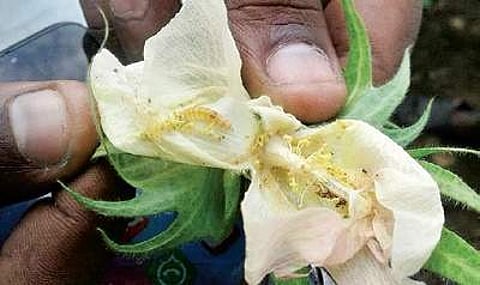

ADILABAD: The farmers who have sown cotton in large areas are worried now with the appearance of pink bollworm in the early-sown plants in a few mandals in the district. Pink bollworm was identified in Tamsi, Talmdaugu, Gudithanoor and Jainath mandals in July.
The insect attacks cotton plants in flowering stage in July. For the last two years its attack has increased in erstwhile Adilabad and the farmers are now worried about their yield. Experts attribute the early sowing responsible for the attack of pink bollworm, which survives and develops during high temperatures of summer.
Speaking to Express, Agriculture Research Station scientist Dr Sridhar Chouhan said normally pink bollworms attack during December, when cotton season is in ending stage, but this time the attack started during sowing season itself.
Scientists of Krishi Vignana Kendra are visiting villages and creating awareness on protecting the crop from pink bollworm attack by conducting meetings. They are suggesting the pesticide required to fight the pest.
Pink bollworm has 40 days life span but within six months it attacks 2 to 3 times destroying the entire cotton crop. Last year 20 per cent cotton plants were destroyed in the attack.
Flowering and fruiting period provide continuous food for them in an overlapping manner.
Rythu Sangham leader K Padmakar Reddy said farmers are worried as they lost their crop last year due to pink bollworm and the yield per acre came down from 8 quintals to 4 quintals, that too of poor quality fetching poor price in the market.
Agriculture scientists are giving advice that all the affected and non affected farmers should use pesticide in their fields. Every year the pest attacks during February which is almost the end of the season, but last year it attacked in August when the crop was in fruit stage.